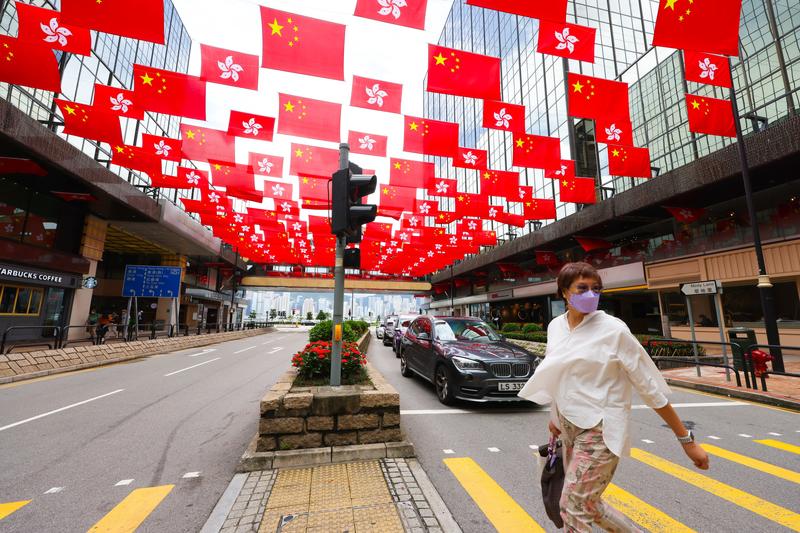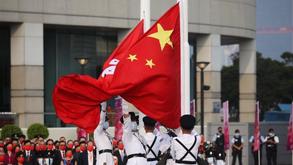Editor’s Notes: Hong Kong is going to celebrate the 25th anniversary of its return to the motherland, the halfway mark of “one country, two systems” practice. In this “Anniversary Talks” series, China Daily invited locals from various sectors to shed light on their views on the city’s changes over the past 25 years and their visions for the city’s future.
In this article, Edward Liu Yang, a veteran mainland-born solicitor who has lived in Hong Kong for 12 years, expressed strong confidence in the city’s rule of law. Calling Hong Kong his second home, Liu said his success in life and career is inseparable from the city.
 This undated file phto shows Edward Liu Yang, a veteran mainland-born solicitor who has lived in Hong Kong for 12 years. (PHOTO PROVIDED TO CHINA DAILY)
This undated file phto shows Edward Liu Yang, a veteran mainland-born solicitor who has lived in Hong Kong for 12 years. (PHOTO PROVIDED TO CHINA DAILY)
1. This year marks the 25th anniversary of Hong Kong’s return to the motherland. How do you view the development of the city over the past 25 years?
Since its return to the motherland, Hong Kong has been making progress in international rankings on the rule of law. According to the Worldwide Governance Indicators project of the World Bank Group, Hong Kong’s percentile rank in respect of the rule of law was 69.85 in 1996 before the return to the motherland.
![]()
With the full implementation of “one country, two systems” and safeguards provided for by the Basic Law after the return to the motherland, Hong Kong’s scores in respect of the rule of law reached 74.75 in 2000 and have been consistently above 90 since 2003. Hong Kong still achieved a score of 91.35 in 2019, despite going through a spate of violence and riots at that time.
The indicators published in September 2021 revealed that Hong Kong attained a score of 91.83 in 2020, demonstrating again that the city’s rule of law has a solid foundation, and that our efforts in the maintenance of the rule of law are recognized internationally.
2. What about the development of “one country, two systems” in the past quarter-century? How have these changes affected the city, as well as you personally?
With the rapid growth of the mainland, I also have a deeper understanding of the famous quote: “When Hong Kong is good, our motherland is good; when our motherland is good, Hong Kong is better”
In 2010, I moved to Hong Kong to work and live. Over the past 12 years, I have had the privilege of witnessing many changes in Hong Kong. I have also become more integrated with this city, and I regard this place as my second hometown. In terms of personal development, I have grown from being a single man. I am now married with a wife and have two sons.
ALSO READ: Lawmaker: Upholding 'one country, two systems' is my mission
I have gone from being a fresh junior lawyer to an established partner in an international law firm. I would say the success in my life and my career is inseparable from Hong Kong. With the rapid growth of the mainland, I also have a deeper understanding of the famous quote: “When Hong Kong is good, our motherland is good; when our motherland is good, Hong Kong is better”.
3. In the past 25 years, many industries have seen things evolve. What about your industry or your sector? Among these changes, what has impressed you the most?
As I said earlier, the rule of law in Hong Kong has made great progress in the 25 years since its return to the country, and its achievements have attracted worldwide attention. As we all know, the rule of law is the foundation of Hong Kong’s long-term prosperity. It is the stability brought by the rule of law that makes Hong Kong an international financial, trade and shipping center, as well as an international legal and dispute resolution service center.
Taking international arbitration as an example, Hong Kong is now a prominent international arbitration center. In particular, with the strong support of Beijing, Hong Kong and the mainland have signed a series of arrangements on arbitral award enforcement and interim measures, creating a unique leading edge for Hong Kong in dealing with cross-border disputes, including those of the Belt and Road Initiative matters.
ALSO READ: CE: HK well-poised to become global arbitration hub
In the field of maritime arbitration, since 2020, Hong Kong has become one of the four international maritime arbitration seats recognized by BIMCO’s model arbitration clause. As a lawyer specializing in international arbitration and commercial litigation, these policies have created a beneficial environment for my career progress.
 A woman cross the road under a myriad of national flags and Hong Kong Special Administrative Region flags. (CALVIN NG / CHINA DAILY)
A woman cross the road under a myriad of national flags and Hong Kong Special Administrative Region flags. (CALVIN NG / CHINA DAILY)
4. Can you still remember what you were doing on Jun 30, 1997? Some, especially in Western countries, predicted Hong Kong’s demise when it was returned to the country on July 1. To this date, such rhetoric continues. How do you feel about that?
The sustained prosperity and stability of Hong Kong resulted from the umbrella and support provided from the motherland since its return and under the principle of “one country, two systems” pursuant to the Basic Law
On June 30, 1997, I was only 11 years old and was still a primary school student in the mainland. Nevertheless, I still clearly remember that at that time, everyone in the country was eagerly looking forward to the return of the city, which washed away the old shame of modern China, and showcased our national strength.
Looking back at the comments that were not optimistic about Hong Kong at that time, I just want to say that facts speak louder than words. The sustained prosperity and stability of Hong Kong resulted from the umbrella and support provided from the motherland since its return and under the principle of “one country, two systems” pursuant to the Basic Law.
ALSO READ: Basic Law a beacon of hope for HK as global finance hub
5. Hong Kong has seen tighter and deeper integration with the Chinese mainland since its return to the motherland. How do you see this going in the next 25 years?
In the next 25 years, I hope and believe that Hong Kong will better integrate into the overall plan of national development and make Hong Kong a part of the national “unified market” through the construction of the Guangdong-Hong Kong-Macao Greater Bay Area, so as to better serve the mainland market and enterprises in the economic development dominated by the domestic cycle.
At the same time, Hong Kong should also take full advantage of the construction opportunities of the Belt and Road Initiative, provide strong support for the country’s further opening-up in the fields of finance, trade, shipping and law, and make contributions to promoting the country’s “domestic and international dual circulation”.
ALSO READ: Support pledged for HK, Macao development
 The flag-raising ceremony is held at Golden Bauhinia Square in Wan Chai, Hong Kong, in celebration of the 72nd anniversary of the founding of the People's Republic of China, Oct 1, 2021. (CALVIN NG / CHINA DAILY)
The flag-raising ceremony is held at Golden Bauhinia Square in Wan Chai, Hong Kong, in celebration of the 72nd anniversary of the founding of the People's Republic of China, Oct 1, 2021. (CALVIN NG / CHINA DAILY)
6. Hong Kong enjoys international standing and many high positions, which are part of its overall competitiveness. What do you think gives Hong Kong its competitiveness? What should it do to consolidate and maintain its competitiveness?
With the establishment of the National Security Law for Hong Kong and the implementation of the reform of the electoral system, Hong Kong, which is “from chaos to governance”, has also entered a new era of development of “one country, two systems”
“One country, two systems” is the biggest advantage and the foundation for Hong Kong’s dazzling achievements in various fields. It is precisely because we belong to the same country that Hong Kong can have the opportunity to integrate into the overall situation of national development, enjoy the national development dividend as “our own” and provide assistance for national development.
At the same time, the implementation of the capitalist system and common law system in Hong Kong allow Hong Kong to be recognized by the international community, including becoming the regional headquarters and financing platform of international multinational enterprises, and becoming an ideal place for Chinese and foreign enterprises to conclude transactions and settle disputes.
Hong Kong has a pool of international capital, extensive international contacts and developed professional services. It has incomparable advantages in giving full play to its strengths and contributing to the needs of the country. With the establishment of the National Security Law for Hong Kong and the implementation of the reform of the electoral system, Hong Kong, which is “from chaos to governance”, has also entered a new era of development of “one country, two systems”.
ALSO READ: Tam: Patriots governance principle prevents chaos in HK
In view of the new chapter, while actively integrating into the overall situation of national development, Hong Kong must also maintain its unique attribute of duality, so as to grasp the construction opportunities of the Belt and Road Initiative and the Guangdong-Hong Kong-Macao Great Bay Area, so as to facilitate the country’s opening-up in an all-around way. This is the only way for Hong Kong to remain irreplaceable and to sustain the notion of “one country, two systems”.
7. What about the next 25 years? Hong Kong has passed the halfway mark of its 50 years unchanged practice of “one country, two systems”. Is there anything that you want to say to Hong Kong residents during this special occasion?
Since the country’s resumption of the exercise of sovereignty over Hong Kong 25 years ago, it is proven that the city is a blessed place that brings hope and opportunities for growth. As the 25th anniversary of the reunification approaches, Hong Kong’s development has entered a new era - with new opportunities and developments. So long as the notion of “one country, two systems” is steadily and continuously upheld, the Hong Kong Special Administrative Region and its people are destined for bright futures.


